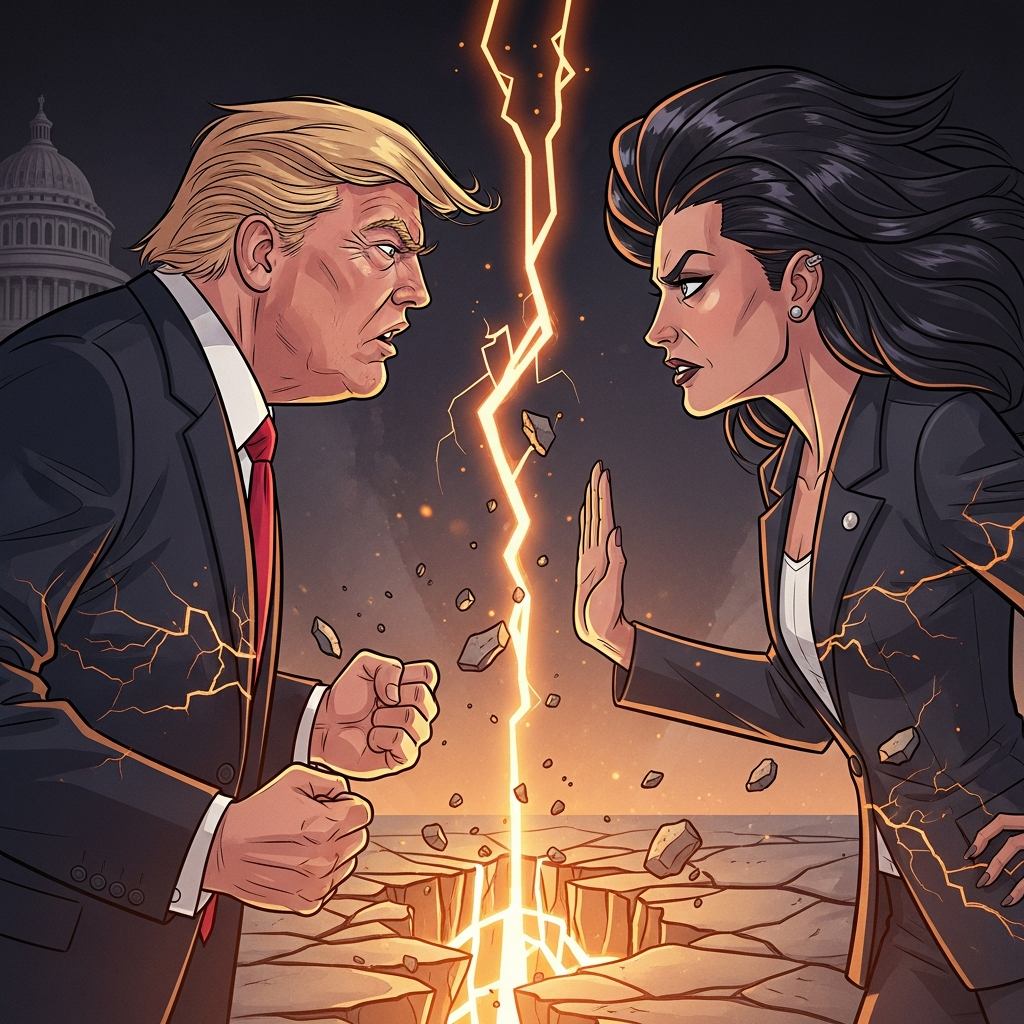An unprecedented public feud has ignited between former President Donald Trump and Congresswoman Marjorie Taylor Greene, signaling a significant fracture within the Republican Party’s hard-right faction. The dramatic conflict, sparked by an impending House vote to release additional Jeffrey Epstein files, has sent shockwaves through the MAGA movement, revealing deep divisions over loyalty, policy, and the persistent shadow of the late financier. This alliance, once considered unshakeable, now faces open hostility, prompting questions about Trump’s control over his base and Greene’s evolving political brand.
The Unthinkable Rift: A MAGA Alliance Crumbles
For years, Marjorie Taylor Greene stood as one of Donald Trump’s most fervent and vocal supporters, a “megaphone” for his “America First” agenda. Her unwavering loyalty extended through numerous controversies, from the Capitol riot to accusations of promoting conspiracy theories. Greene often boasted about fighting harder for Trump than anyone, even claiming to have “worshipped” him and influenced his staff decisions. She openly campaigned to be his running mate, embodying the combative, anti-establishment spirit that defined Trump’s presidency.
However, recent months saw cracks emerge as Greene began to forge her own “First America First” path. This new approach led her to take positions at odds with mainstream GOP leadership and, more recently, even with Trump’s inner circle. The tipping point arrived with the House’s push to release the Justice Department’s files related to Jeffrey Epstein, the convicted sex offender whose network touched powerful figures globally.
Epstein Files: The Catalyst for Conflict
The public release of Jeffrey Epstein’s files has long been a bipartisan demand, fueled by a desire for accountability and transparency. Greene became a prominent advocate, aligning herself with victims and joining a rare group of only four House Republicans to sign a discharge petition. This petition, co-signed by all 214 Democrats, aimed to force a vote on the full release of the Epstein documents. Her stance brought her into direct conflict with Trump, who has consistently denied any wrongdoing concerning Epstein and has faced bipartisan criticism over his handling of related files. Trump maintained a friendship with Epstein for years, asserting it ended in the early 2000s before Epstein’s initial arrest.
Greene’s active pursuit of the files, coupled with her growing criticisms of Trump’s decisions on foreign conflicts and tariff policies, evidently “sent him over the edge,” as she later claimed. This perceived disloyalty, particularly on such a sensitive and long-running controversy, proved to be an unacceptable transgression for the former president.
Trump’s Fiery Retaliation: A “Wacky” “Traitor”
The feud escalated dramatically on a Friday evening following a press query to Trump about Greene’s demand for the Epstein files. Trump swiftly launched a series of aggressive social media attacks, publicly withdrawing his endorsement of Greene on Truth Social. He branded her “wacky,” a “ranting lunatic,” and accused her of constantly complaining. He claimed Greene turned on him after he advised her against running for governor or senator in Georgia, stating she was upset he no longer returned her calls.
The attacks intensified, with Trump later calling Greene a “traitor” and a “disgrace to our GREAT REPUBLICAN PARTY!” He vowed to support any Republican opponent challenging her in next year’s midterm elections, effectively excommunicating her from his inner circle. These public denunciations, from the “most powerful man in the world” as Greene described him, marked a stark departure from their previous alliance.
Greene Fires Back: Safety, Independence, and the Epstein Factor
Marjorie Taylor Greene wasted no time in defending her position and counter-attacking. On social media platform X, she accused Trump of actively trying to prevent other Republicans from voting for the Epstein petition, suggesting he was using her as an example to “scare all the other Republicans” before the vote. She expressed astonishment at the intensity of his efforts to block the files’ release, stating, “It’s astonishing how hard he’s fighting to stop the Epstein files from coming out that he actually goes to this level.”
Greene also revealed that Trump’s public attacks had made her a target for threats, leading private security firms to issue warnings. She admitted this experience gave her a “small understanding of the fear and pressure the women, who are victims of Jeffrey Epstein and his cabal, must feel.” Emphasizing her independence, she declared, “I don’t worship or serve Donald Trump,” highlighting her commitment to holding power accountable, even when it means challenging a former ally.
The Enduring Shadow of Jeffrey Epstein
The dispute over the Epstein files highlights a long-standing controversy that continues to dog Trump. Recent releases of over 20,000 pages of documents by the House Oversight Committee have unveiled extensive email exchanges involving Epstein and a diverse group of high-profile individuals, including former government officials, celebrities, and business figures. These documents, including earlier releases, have intensified scrutiny on Trump’s knowledge of Epstein’s illicit activities, which Trump vehemently denies, labeling them politically motivated.
The emails reveal a complex web of relationships and candid discussions, often critical of the former president. For instance, former Treasury Secretary Larry Summers called Trump a “clown, increasingly dangerous” and predicted his “world will collapse.” Author Michael Wolff, who interviewed Epstein for a book on Trump, was advised by Epstein on discrediting allegations, including claims a former girlfriend could attest Bill Clinton was “never on the island.” Epstein also offered Wolff “photos of donald and girls in bikinis in my kitchen,” to which Wolff reportedly replied, “Yes!!”
Other interactions include Epstein communicating with “The Duke” (Prince Andrew) about upcoming media stories, and with former White House Counsel Kathryn Ruemmler discussing Trump’s legal issues. Epstein himself characterized Trump as feeling “alone, and is nuts !!!…evil beyond belief mad,” suggesting he could “crack.” These documents underscore Epstein’s strategic efforts to manipulate public opinion and discredit accusers, further fueling public demand for full transparency.
Political Fallout: An Earthquake for the MAGA Ecosystem
The public breakdown between Trump and Greene represents more than a personal disagreement; it’s an “earthquake for the MAGA ecosystem,” transforming a previously “joined at the hip” alliance into “open hostility.” Political strategists like Robert Moran suggest Trump’s actions indicate a strong desire to prevent the Epstein files from being released, using Greene as an example to pressure other Republicans. Moran, however, doubts the dispute will significantly impact Trump’s popularity, noting that many of Trump’s supporters, often skeptical of authority, would likely back the release of such files to hold power accountable.
This rift also points to a strategic political shift for Greene, who appears to be refining her brand. While her voters largely remain loyal through her evolution, the “elephant in the room” is the potential for an internal primary challenge from Trump allies, particularly in her deep-red Georgia district. Trump’s threat to support a primary challenger, even calling Greene “far left” despite her conservative record, adds significant volatility to upcoming elections and could undermine the Republican party’s fragile gains in the state. Her past experience against well-funded challengers indicates a Trump-backed opponent would pose a serious threat.
Beyond Epstein: Other Points of Contention
While the Epstein files served as the primary trigger, other policy differences had already begun to fray the Trump-Greene alliance. Greene has voiced criticisms regarding U.S. aid to Israel and involvement in the Middle East and Ukraine. She previously split with GOP leaders over government shutdown tactics and even advocated for an extension of the Affordable Care Act (ACA), drawing criticism from within her party. This evolving “First America First” approach, emphasizing independent judgment even when it deviates from Trump’s immediate directives, ultimately led to the unprecedented public severing of ties.
The conflict highlights the complexities of maintaining influence within the Trump orbit, contrasting Greene’s messy public split with the more nuanced relationship other Trump loyalists, like Kentucky Rep. Thomas Massie, have managed to maintain despite policy disagreements. The highly public nature of this “MAGA divorce” underscores the internal dynamics shaking Trump’s political movement, leaving a lasting impact on his hard-right base.
Frequently Asked Questions
What triggered the public feud between Donald Trump and Marjorie Taylor Greene?
The immediate trigger for the public feud was Congresswoman Marjorie Taylor Greene’s vocal support for a House vote to release additional Jeffrey Epstein files. Greene was one of only four House Republicans to sign a discharge petition aimed at forcing this vote. Former President Trump swiftly retaliated with aggressive social media attacks, branding her “wacky,” a “ranting lunatic,” and a “traitor,” publicly withdrawing his endorsement and accusing her of disloyalty after he had advised her against running for higher office in Georgia.
How did the House vote to release the Epstein files become a point of contention?
The House vote on releasing the Epstein files became a flashpoint because Greene, a staunch Trump ally, actively pushed for transparency by signing a discharge petition alongside Democrats. This move went against Trump’s apparent wishes, as he publicly opposed the full release of the files and, according to Greene, tried to “scare” other Republicans from supporting it. The controversy highlights Trump’s long-standing connection to Epstein and the intense scrutiny surrounding the unsealed documents, making any stance on their release politically charged.
What are the potential political consequences of this Trump-Greene rift for the Republican party?
This public feud signifies a significant fracture within the MAGA movement, creating an “earthquake for the MAGA ecosystem.” For the Republican Party, especially in Georgia where Greene holds a district, the rift could introduce volatility and undermine party unity. Trump’s threat to support a primary challenger against Greene means she could face a formidable opponent, potentially diverting resources and attention during midterm elections. The dispute also challenges Trump’s absolute control over his base, as many of his supporters, skeptical of authority, might favor the release of the Epstein files, indicating a complex and evolving dynamic within the GOP.
This dramatic public split between two of the most recognizable figures in modern Republican politics marks an undeniable shift. The enduring shadow of Jeffrey Epstein, coupled with Greene’s evolving political independence, has exposed the fragilities within the MAGA movement. As the House vote on the Epstein files approaches and the 2025 political landscape unfolds, the repercussions of this feud will undoubtedly continue to shape the Republican Party’s trajectory and influence the narrative surrounding powerful public figures.



